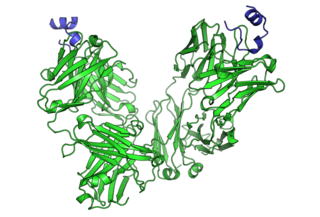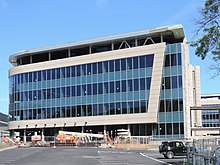
Cancer immunotherapy is the artificial stimulation of the immune system to treat cancer, improving on the immune system's natural ability to fight cancer. It is an application of the fundamental research of cancer immunology and a growing subspeciality of oncology. It exploits the fact that cancer cells often have tumor antigens, molecules on their surface that can be detected by the antibody proteins of the immune system, binding to them. The tumor antigens are often proteins or other macromolecules. Normal antibodies bind to external pathogens, but the modified immunotherapy antibodies bind to the tumor antigens marking and identifying the cancer cells for the immune system to inhibit or kill. In 2018 James Allison and Tasuku Honjo received the Nobel Prize in Physiology or Medicine for their discovery of cancer therapy by inhibition of negative immune regulation.
Panitumumab (INN), formerly ABX-EGF, is a fully human monoclonal antibody specific to the epidermal growth factor receptor.
Mepolizumab is a humanized monoclonal antibody used for the treatment of severe eosinophilic asthma. It recognizes and blocks interleukin-5 (IL-5), a signalling protein of the immune system.
Siltuximab is a chimeric monoclonal antibody. It binds to interleukin-6. Siltuximab has been investigated for the treatment of neoplastic diseases: metastatic renal cell cancer, prostate cancer, and Castleman's disease, among other types of cancer.
Spectrum Pharmaceuticals is an American biopharmaceutical company. The company is located in Irvine, California.
Secukinumab, trade name Cosentyx, is a human IgG1κ monoclonal antibody that binds to the protein interleukin (IL)-17A, and is marketed by Novartis for the treatment of psoriasis, ankylosing spondylitis, and psoriatic arthritis.
Sarilumab is a human monoclonal antibody against the interleukin-6 receptor. Regeneron and Sanofi developed the drug for the treatment of rheumatoid arthritis (RA), for which it received US FDA approval on 22 May 2017 and European Medicines Agency approval on 23 June 2017.

Nivolumab, marketed as Opdivo, is a medication used to treat cancer. It is used as a first line treatment for inoperable or metastatic melanoma in combination with ipilimumab if the cancer does not have a mutation in BRAF, as a second-line treatment following treatment with ipilimumab and if the cancer has a mutation in BRAF, with a BRAF inhibitor, as a second-line treatment for squamous non-small cell lung cancer, and as a second-line treatment for renal cell carcinoma. Nivolumab has recently been approved for small cell lung cancer.
Alirocumab is a biopharmaceutical drug approved by the FDA on July 24, 2015 as a second line treatment for high cholesterol for adults whose cholesterol is not controlled by diet and statin treatment. It is a human monoclonal antibody that belongs to a novel class of anti-cholesterol drugs, known as PCSK9 inhibitors, and it was the first such agent to receive FDA approval. The FDA approval was contingent on the completion of further clinical trials to better determine efficacy and safety.
Fasinumab is a human monoclonal antibody designed for the treatment of acute sciatic pain.
Dupilumab, sold under the trade name Dupixent, is a monoclonal antibody designed for the treatment of allergic diseases such as eczema. Side effects include allergic reactions, cold sores, and inflammation of the cornea. It was developed by Regeneron Pharmaceuticals and Sanofi Genzyme. It received approval from the United States Food and Drug Administration for moderate-to-severe atopic dermatitis in 2017. As of 2017 it costs about 37,000 USD per year.
Tildrakizumab is a monoclonal antibody designed for the treatment of immunologically mediated inflammatory disorders. In the United States, it is approved for the treatment of moderate-to-severe plaque psoriasis.
Evolocumab is a monoclonal antibody designed for the treatment of hyperlipidemia.
Anti–vascular endothelial growth factor therapy, also known as anti-VEGF therapy or anti-VEGF medication, is the use of medications that block vascular endothelial growth factor. This is done in the treatment of certain cancers and in age-related macular degeneration. They can involve monoclonal antibodies such as bevacizumab, antibody derivatives such as ranibizumab (Lucentis), or orally-available small molecules that inhibit the tyrosine kinases stimulated by VEGF: lapatinib, sunitinib, sorafenib, axitinib, and pazopanib.
MM-151 is an oligoclonal mixture of fully human monoclonal antibodies, which binds multiple parts of the EGFR molecule It has started clinical trials in patients with RAS wild-type colorectal cancers (CRCs) that were resistant to other anti-EGFR therapies. It is intended to overcome the problem of cancers becoming resistant to monoclonal antibody therapies.
Cemiplimab (REGN-2810) is a monoclonal antibody under development as a drug for the treatment of squamous cell skin cancer, myeloma, and lung cancer.

SillaJen, Inc. is a South Korea-based biotechnology company, with offices in Busan, Yangsan and Seoul, South Korea, and San Francisco, California.








